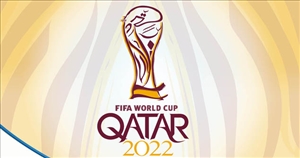By Andrew Warshaw
November 21 – Exactly four years to the day before the first ever winter World Cup kicks off, UEFA’s president Aleksander Ceferin says there would have to be a new vote if Qatar 2022 is expanded from 32 to 48 teams and shared with its neighbours.
FIFA’s ruling Council are due to decide on expansion at its next meeting in Miami in March but Ceferin says a fresh ballot may be required if there is a change to the format.
As things stand now, expansion is only due to start at the 2026 World Cup but FIFA has not ruled out bringing that forward to 2022, with Gianni Infantino still angling to add 16 more teams.
If it happens, the tournament would have to be shared since Qatar, the smallest country ever to host the finals with the distance between the two furthest venues a mere 72 kilometres, are only building eight stadiums.
“Can we do it for 2022? It is a difficult challenge,” Infantino said earlier this month. “We are in discussion with Qatar. It will be a very, very difficult challenge. What are the chances? Certainly small but what is wrong in discussing it?
“Personally, as president of FIFA, I would be very happy if some matches could be shared with some countries in the region. Football unites, builds bridges; that could be a concrete result.”
But Ceferin has poured cold water on the idea, telling the BBC: “The bidding process was made for one country.”
“Do you have to go to the bidding process again? Do we have to vote if some other countries want to host? Because only the FIFA congress can decide where the competition can be if it is also out of Qatar.”
However, he believes any expansion is unlikely.
“I think the idea is quite unrealistic. I don’t think FIFA even thinks seriously about changing the format. There are many problems. Also the political situation to share it in the Gulf seems a bit strange.”
With the most controversial World Cup in the tournament’s 92-year history kicking off 21 November 2022, local organising committee chief Hassan Al Thawadi is taking a cautious approach over any possible expansion.
“It will be a common decision taken between FIFA and Qatar and we are now studying the feasibility of expanding it to a 48-team World Cup,” he said recently. “However, all preparations are on the basis of 32 teams.”
Al-Thawadi insisted the competition would be a unique experience for fans despite all the negative issues associated with it, notably its winter scheduling bang in the middle of the European league season, human rights concerns and size.
“In four years’ time, 1.5 million fans will descend on Qatar from every corner of the globe and billions more will tune in on their TVs, smartphones and tablets to watch 28 days of football,” he said. “It will be a momentous occasion for the teams participating, the fans watching, and for the whole Arab world, which is eagerly anticipating hosting the showpiece event of the most popular sport in the world for the first time ever.”
With Qatar still the subject of a Saudi-led diplomatic and trade blockade, widening the tournament would be hugely problematic not just from a logistical but also geo-political standpoint.
“To think there are people in the region who might not enjoy the first World Cup in the Middle East is very disappointing,” said Al Thawadi. “We look forward to this matter being sorted out. Football is for the people and we want this tournament to reach the people of the region.”
Contact the writer of this story at moc.l1744474374labto1744474374ofdlr1744474374owedi1744474374sni@w1744474374ahsra1744474374w.wer1744474374dna1744474374

